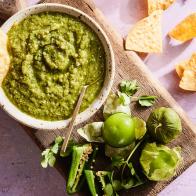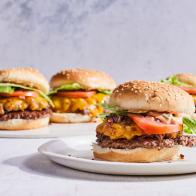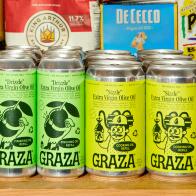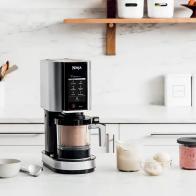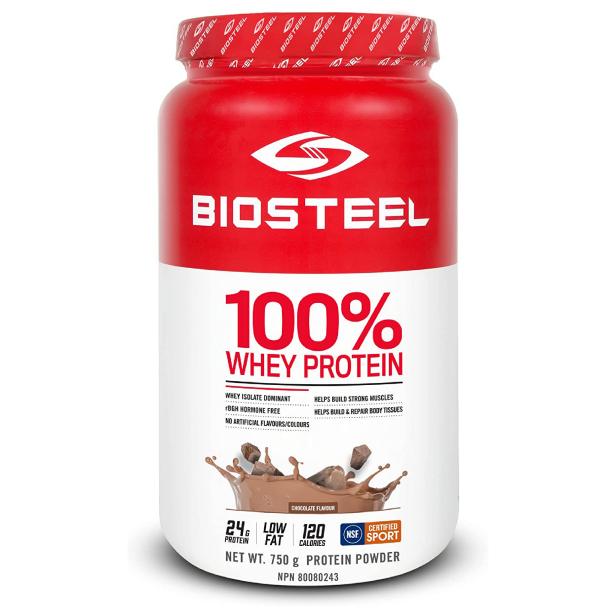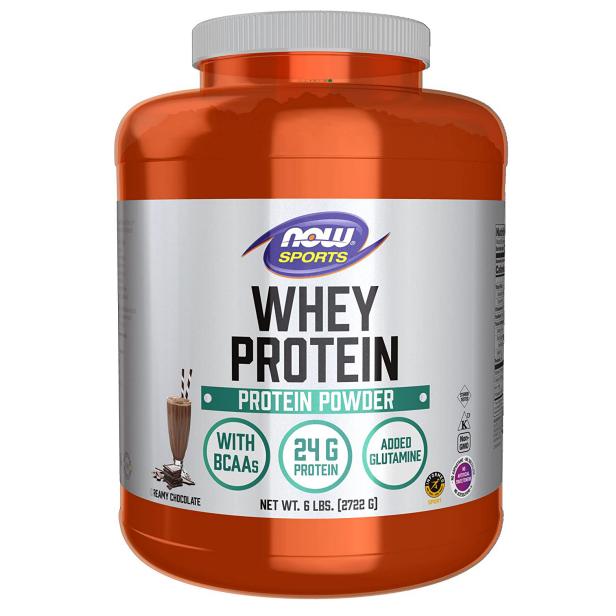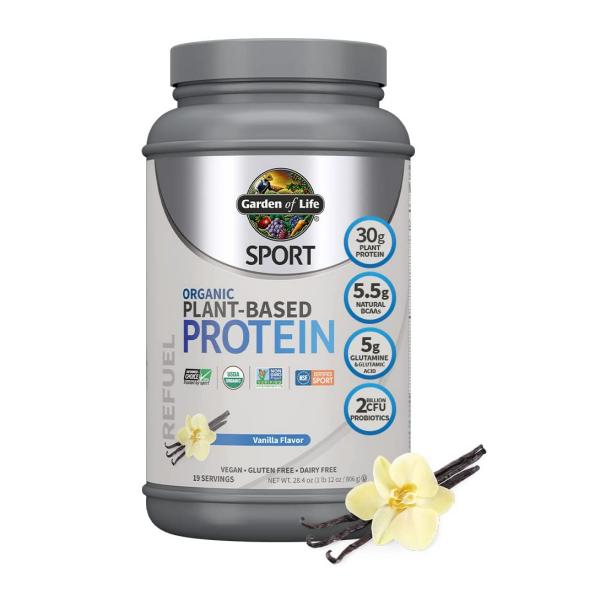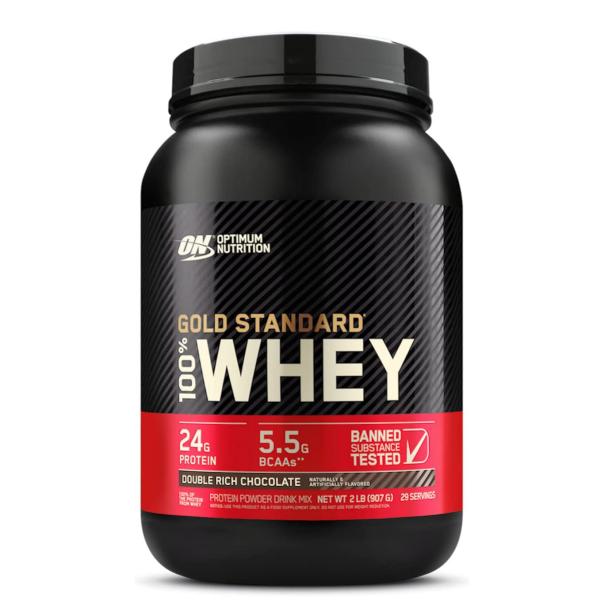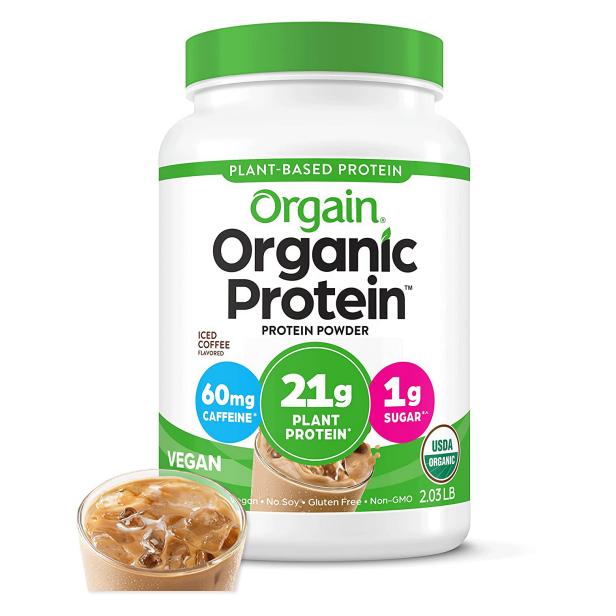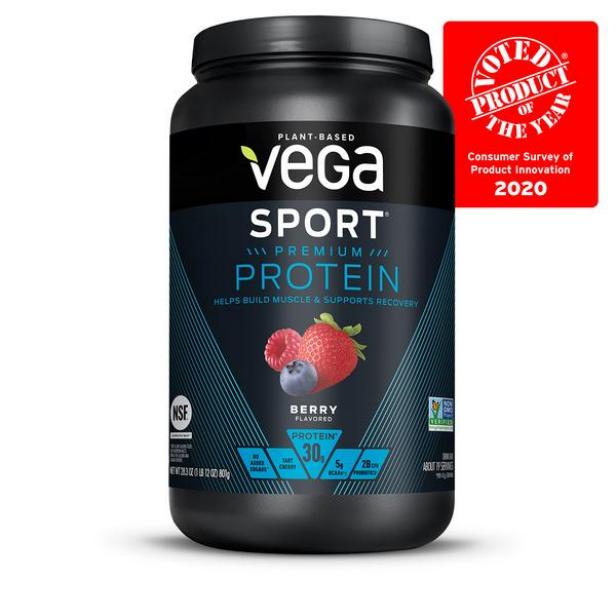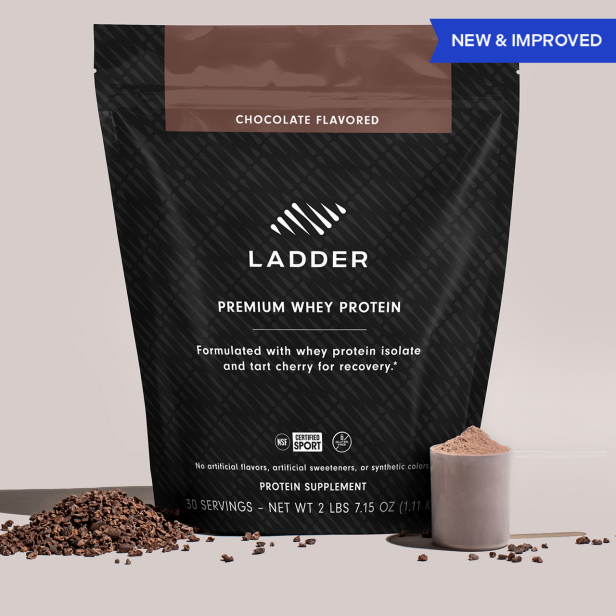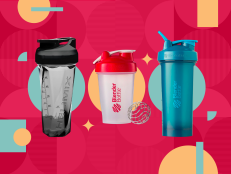8 Best Protein Powders of 2024, According to a Registered Dietitian
These are the best protein powders you can buy, whether you're looking for a specific flavor or protein source.

Photo c/o Optimum Nutrition
Our Top Protein Powder Picks
- Best Overall: BioSteel 100% Whey Protein
- Best Chocolate: NOW Foods Whey Protein Creamy Chocolate
- Best Vanilla: Garden of Life Sport Plant-Based Vanilla
- Best Budget-Friendly: Optimum Nutrition Gold Standard 100% Whey
- Best Flavor (Not Vanilla or Chocolate): Orgain Iced Coffee
- Best Vegan: Vega Sport
- Best Small Brand: Ladder Protein
- Most Versatile: Bob’s Red Mill Almond Protein Powder
Protein powders are most definitely not created equal, and trying to find the best one for your needs whether you're vegan, an athlete or pregnant can be beyond complicated. With so many brands, flavors and protein sources on the market, deciphering the label can feel overwhelming. We did the leg work for you and asked a registered dietitian and certified athletic trainer, and these powders earned top honors.
Protein powders are dietary supplements and are meant to supplement gaps in the diet – not replace whole foods. If you are pressed for time after a workout or trying to boost the protein at a meal or snack, protein powders can be a convenient way to help, but keep in mind, they are not one size fits all. Formulations vary and many include extensive lists of additional ingredients that you may or may not want in your day. Contrary to popular belief, there’s no need to add protein powder to all meals and snacks. Seek out predominantly protein-rich foods to help you achieve your daily needs first. Then, a reasonable use of a protein powder — no more than one serving a day — can help you reach your protein goals. Ideally, protein powder should contain all essential amino acids (aka – protein building blocks); these are inherently found in animal-based proteins or from a combination of plant-based sources.
Most protein powders contain little or no carbs but taste sweet with the addition of low or no calorie sweeteners like stevia and sucralose. Protein powders are simple for on-the-go prep – simple shake or mix with water or another liquid using a protein shaker or blender.
Is Protein Powder Regulated?
Since dietary supplements are poorly regulated, competitive athletes or those with dietary restrictions should seek out supplements with third-party verification from companies like NSF Certified for Sport and Informed Sport to ensure label accuracy.
- Trusted brand
- Popular with professional sports organizations
- Higher price point
NSF certified and used by a wide range of athletes, whey protein is the most easily digestible form for most people. Despite being made from milk, whey protein isolate (the most plentiful type in this product), is virtually lactose free. This form is also lower in carbs and fat than other forms of whey protein making it a great all around choice for athletes and exercise enthusiasts alike.
- Protein Type Whey blend (isolate, concentrate, hydrolysate)
- Protein Per Serving 24 grams per scoop (30g)
- Calories Per Serving 120 calories per scoop (30g)
- Third Party Tested Yes
- Good flavor
- Trusted brand
- High price point
- Some sizes can be hard to find
Chocolate lovers don’t need to look any further than this amazing-tasting whey protein option available in both whey protein concentrate and isolate forms. It contains no added sugars yet makes everything taste like a chocolate milkshake, plus it is Informed Sport certified with 24 grams of protein per serving.
- Protein Type Whey blend (isolate and concentrate)
- Protein Per Serving 24 grams per scoop (42g)
- Calories Per Serving 160 calories per scoop (42g)
- Third Party Tested Yes
- Plant-based and provides all essential amino acids
- Lower in protein compared to whey
A tasty protein blend made from organic pea and sprouted beans and lentils. Mix with water or almond milk for a scrumptious post workout refresher.
- Protein Type Plant-based blend (pea, bean, lentil, seed)
- Protein Per Serving 15 grams per scoop (22g)
- Calories Per Serving 90 calories per scoop (22g)
- Third Party Tested Yes
- Good value
- Easy to find
- Some flavors are better than others
A great value and easy to find at several retailers. This balanced blend of whey protein comes in a wide (like, super wide) variety of flavors, including Banana Creme and Rocky Road. Prices may vary and it often goes on sale, but you can typically find this tried and true brand for around $0.75 per ounce, which is nearly 50% less than some of its competitors.
- Protein Type Whey blend (isolate, concentrate, peptides)
- Protein Per Serving 24 grams per scoop (30.4 g)
- Calories Per Serving 120 calories per scoop (30.4 g)
- Third Party Tested Yes
- Certified organic
- Not third party tested
Complete with a reasonable jolt of caffeine (60 mg per serving), this plant-based protein blend made from pea, chia and brown rice and sweetened with stevia, is flavorful and a fun detour from your typical flavored protein powder.
- Protein Type Plant blend (pea, brown rice, chia)
- Protein Per Serving 21 grams per 2 scoops (46g)
- Calories Per Serving 170 calories per 2 scoops (26g)
- Third Party Tested No
- Plant-based with ample protein dose
- Limited flavor selection
This plant protein made from pea, pumpkin and sunflower seeds also features tart cherry for muscle recovery, probiotics and antioxidants from bromelain and turmeric. You will find 30 grams of protein per scoop and it comes in 5 flavors.
- Protein Type Blend (pea, pumpkin seed, sunflower seed, alfalfa)
- Protein Per Serving 30 grams per scoop (41g)
- Calories Per Serving 170 calories per scoop (41g)
- Third Party Tested Yes
- Great flavor
- Mixes well
- Harder to find than other brands
Loved by athletes, this brand offers a wide range of performance nutrition products. Their NSF certified whey and plant-based protein powders (made from pea protein) also include tart cherry extract to assist with post exercise recovery.
- Protein Type Whey protein isolate
- Protein Per Serving 30 grams per 1 scoop (37g)
- Calories Per Serving 140 calories per 1 scoop (37g)
- Third Party Tested Yes
- Unique protein source
- Single ingredient
- Missing some essential amino acids
A neutral flavored and simple powder perfect for baking, oatmeal and protein balls. A 1/3 cup (1.5 oz) serving has a respectable 17 grams of protein and it made without sweeteners, colors or flavors.
- Protein Type Almond
- Protein Per Serving 20 grams per 1/3 cup (44g)
- Calories Per Serving 180 calories per 1/3 cup (44g)
- Third Party Tested No
FAQs
How much protein powder should I take?
Doses vary by brand, but a good target would be 25 to 30 grams per serving. Most folks should limit to 1 serving to make sure they are eating plenty of protein rich foods at most meals and snacks.
What should I take if protein powder hurts my stomach?
Protein doses as high as protein powders are best for post workout. A high amount of protein before exercise can lead to stomach upset due to slow digestibility. Check ingredient lists to ensure your protein powder doesn’t contain an ingredient that typically upsets your stomach, there are plenty of different options to switch to.
Is protein powder healthy?
A safe and properly dosed and timed protein powder can certainly be an addition to a healthy diet and can be a convenient way to help you reach your daily protein goals. It is not superior to protein-rich foods as part of a balanced diet.
How to Read an Ingredient list
When seeking a protein powder it’s important to realize that they are not one-size-fits-all. Protein sources vary, even when they are derived from the same source. For example, whey protein isolates have a higher percent protein content by weight and virtually no lactose, while whey protein concentrates powders are made differently – they tend to be more affordable, and contain less protein and slightly more carbs per serving. Many brands also contain a lot more than just a protein source. Check ingredient lists carefully for additional ingredients including caffeine, creatine, probiotics, vitamins and minerals. While some of these add-ins may be desirable, you should know if they are part of your protein supplement or not. Most protein powders are also sweetened with calorie-free sweeteners like stevia, sucralose and monk fruit. This keeps the calories and carbs low, which may not be ideal for recovery.
Since dietary supplement manufacturers do not have to follow FDA guidelines for ingredient disclosure, seeking a third party tested brand or a product with a label titled “Nutrition Facts” (as opposed to a “Supplement Facts”) is the best way to help ensure the label is accurate.
What about performance enhancers?
There are numerous ingredients often added to protein powders that promise to enhance performance including creatine, branched-chain amino acids (BCAAs), HMB, glutamine and stimulants like caffeine and guarana. These substances vary in safety and effectiveness and risk side effects and medication interactions in some individuals. Athletes subject to drug testing also need to be especially careful of these types of ingredients — more important reasons to take inventory of what is in your protein powder of choice. Athletes and exercise enthusiasts can learn more about these types of ingredients from the U.S Anti-Doping Agency.
*This article was written and/or reviewed by an independent registered dietitian nutritionist.
Dana Angelo White, MS, RD, ATC, is a registered dietitian, certified athletic trainer and owner of Dana White Nutrition, Inc., which specializes in culinary and sports nutrition. She is the author of four cookbooks First Bites: Superfoods for Babies and Toddlers, The Healthy Air Fryer Cookbook, The Healthy Instant Pot Cookbook and Healthy Quick and Easy Smoothies.
Related Content:


